Recently, Cointuz.com site surfaced, promoting itself as a platform where you can safely store cryptocurrency and other assets. I managed to gather reliable proof that clearly reveals it is, in fact, a scam site.
Contrary to the statements of Cointuz.com, they will never give back your capital. Despite the money displayed in the “member area”, there is no possibility to withdraw even a penny. All commitments regarding crypto incentives are empty as well.
Cointuz Scam Overview
The key service that Cointuz strives to provide is a safe and user-friendly crypto wallet service. The site pledges crypto exchange solutions, tools for controlling wallets, transfers, dashboards, and similar stuff. In fact, they endeavor to emulate the functionality of a crypto trading platform, like Binance or Coinbase. However, it actually exclusively serves as a cover intended to mislead the cautious.
To begin with, Cointuz imitates the layout of numerous equivalent websites. There are quite a few examples, like Coinmuz, Pulamex or Podrax. They are entirely identical in terms of visual elements, with minor discrepancies in the webpage header. Other particulars, and sometimes even crypto wallet addresses, are the same. Presumably, all these fraudulent online platforms are operated by the same group of scammers.
Cryptocurrency Scam Summary
| Website | Cointuz.com |
| Hosting | AS13335 Cloudflare, Inc. United States, San Francisco |
| IP Address | 172.67.216.6 |
| Threat Type | Scam/Fraud |
| Scam Type | Fraudulent offers of cryptocurrency services |
How the Cointuz Scam Works?
Cointuz is yet another website within a wide-ranging network of associated crypto fraudulent platforms. The administrators utilize different brand names and websites, like Cointuz.com, to trap victims. Nonetheless, these false sites possess matching designs, terms of service, and About content. This unveils their origins as components of the same criminal network, which promotes the similar form of deception under various appearances. The scammers just duplicate the equal scam website under diverse names to mislead users into believing they are enrolling a new venture. However, in actuality, it’s the same group of scammers orchestrating the fraudulent promises and efforts to grab deposited funds. The managers skillfully make use of psychological strategies and enticing offers to carry out their deceitful schemes.
Step 1: Spreading
To start the scam, criminals establish and fill accounts on popular social media platforms. They primarily target Facebook, Instagram, Twitter, and TikTok. Subsequently, the promotional campaign begins. Using bots and sponsored ads (when feasible), fraud actors boost the presence of their deceptive activities to possible victims. This tactic enables them to create an extensive net and interact with their targeted spectators. The latter commonly consists of cryptocurrency enthusiasts looking for chances to make profits.
Users receive an incentive to register, attracted by the commitment of obtaining crypto rewards valued at hundreds of dollars, all for free. To augment the appeal of the offer, false suggestions of cooperation with a celebrity are added. As you may guess, these assertions are entirely baseless.
Step 2: Gaining Traffic
Users who express interest check out Cointuz.com via links featured in advertisements or bot-generated posts. The website utilizes captivating visuals, design features that appear genuine, and assertions of holding a official license, all intended to project an initial impression of trustworthiness.
Step 3: Data Gathering
To redeem their rewards, users need to actively sign up on Cointuz and get instructions to provide sensitive and personal data during the enrollment procedure. This comprises linking their cryptocurrency wallets, providing email addresses, specifying phone numbers, furnishing identification papers, and more.
Step 4: Requesting funds
Once registered, users notice substantial amounts of cryptocurrency, valued at thousands of dollars, within their Cointuz wallets. Nonetheless, as is standard with such incentives, you can’t withdraw them before topping up your account. Normally, a deposit of $100 is required to get the sign-up bonus. This prerequisite serves as the enticement that eventually leads to the money loss.
Step 5: Disappear
The moment the deposit is submitted, the scammers terminate all communication. They move forward to block users, erase accounts, and disappear with both the deposited money and vital personal information. The fabricated rewards persist perpetually uncredited, as they lack genuine existence. They act exclusively as a fraudulent ploy. This method forms the foundation for the deceivers’ capability to mislead victims and steal hard-earned earnings through their duplicative internet-based crypto fraud.
Signs of Scam
I gathered several facts that point at the scammy nature of the Cointuz.com. Actually, there are a lot of scams that fall under the same points, so they are pretty much universal.
- Cryptocurrency-Only Transactions. Cointuz.com insists on cryptocurrency payments exclusively, excluding conventional methods like bank transfers. This strategy ensures anonymity for the scam and eliminates any possibility of seeking refunds.
- Dubious Company Credentials. Cointuz arouses suspicion by failing to provide critical information about ownership, location, and legal registration. The lack of valid contact details and the recent creation of domain and social media profiles cast doubt on its legitimacy.
- Baseless Hype Generation. Cointuz resorts to fabricating non-existent achievements, such as contracts with Coinbase or endorsements from Elon Musk, to manipulate emotions and enhance the perception of potential returns, enticing victims to invest more.
- Fictitious Celebrity Association. Cointuz employs a deceptive tactic by falsely associating itself with well-known figures like Elon Musk, Jeff Bezos, Mr. Beast, and Mark Zuckerberg. Additionally, the scam falsely claims partnerships with established entities like Coinbase, Binance, or MetaMask to bolster its false credibility.
- Potential Ponzi-Like Model. The scam operates on a pyramid-style referral system disseminated through social media, benefiting only initial participants and relying on later investments to sustain the illusion.
- Unrealistic Profit Promises. Promising improbable returns of 50-100-200%, Cointuz capitalizes on the desire for high profits. However, the tumultuous nature of the cryptocurrency market renders such gains implausible, solidifying Cointuz.com as a definite scam.
What Should I do as a Victim?
If you had to deal with Cointuz site and fell victim to that scam, there are still some steps to take. They will make further scam attempts harder, and also boost the knowledge about that scam among folks.
- Report the scam to authorities. Search for local authorities responsible for financial frauds, and also notify wallet providers and social networks via their tech support. It is essential to make the further operations of these scammers much harder.
- Tell your close friends. That step is similar to reporting to the authorities, and has similar effects. By posting info about scam crypto service, you decrease the pool of people they can fool.
- Get evidence. Screenshot or save all the information related to the website. URL, screenshot of a main page, login window, EULA, account top-up menu, wallet addresses – all these things may be useful for authorities to find the scammers.
- Check whether you can ask for a refund. As I’ve said above, crypto payments do not fall under refund policies in most banks. Nonetheless, in some circumstances, it is still possible. Never lose hope until you actually confirm it is gone.
- Make your mistake your lesson. Financial losses are always a reason for frustration, but let’s imagine it was a pay for scam revealing courses. Remember the key features of these crypto scam sites, the way they attract people and what they promise. In the future, you will easily recognize a trap of spending no money.
Scan your system for possible malware infections
Beware of cross scams! Scam actors can use your trust to make you download some stuff or interact with certain documents. It may be a trap that installs malware to your system. There are no moral barriers or limits for these scoundrels.
Throughout the course of the fraud, its actors may get in touch with you with specific documents. Alternatively, they may offer you to deploy “cryptocurrency wallet applications” or “browser extensions” to streamline access to your cryptocurrency funds. As we already figured out, these rascals have no plan of returning your capital. So, what do these messages and browser extensions represent? Correct – that is another element of the fraudulent scheme designed to throw you into deliberately running destructive software onto your device.
Both add-ons and files added to email messages can function as a shell for different malware. In this scenario, I anticipate the presence of spyware and stealers among all types of threats. While it is not obligatory for scammers to distribute malware, the probability is always significant. As stated, their conscience is of little concern, and their dignity is already severely tarnished. They have nothing to lose and strive to boost revenues.
Remove spyware with Gridinsoft Anti-Malware
We have also been using this software on our systems ever since, and it has always been successful in detecting viruses. It has blocked the most common malicious programs as shown from our tests with the software, and we assure you that it can remove spyware as well as other malware hiding on your computer.
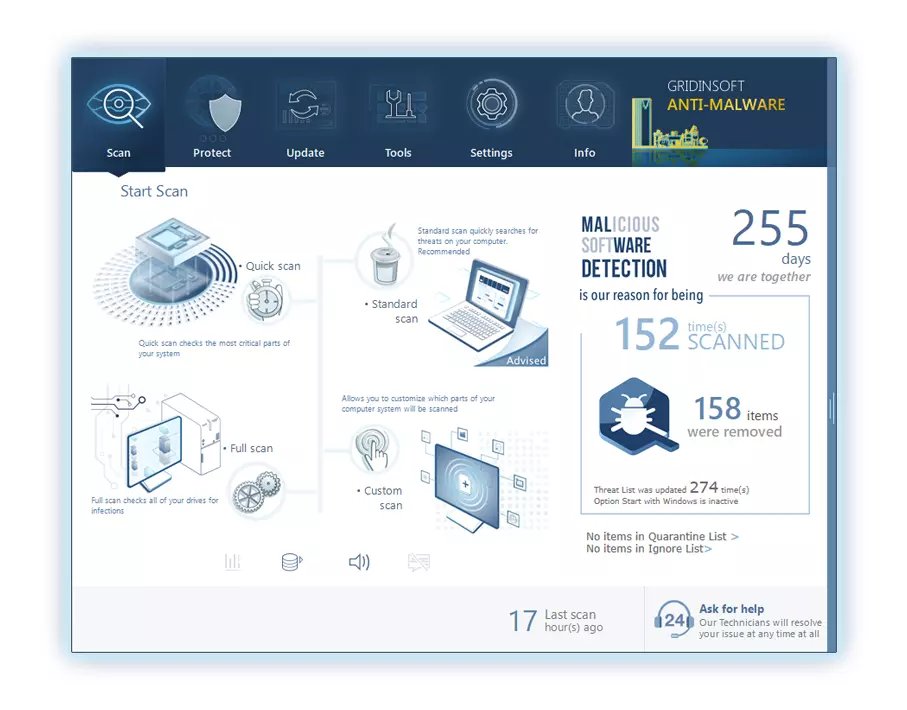
To use Gridinsoft for remove malicious threats, follow the steps below:
1. Begin by downloading Gridinsoft Anti-Malware, accessible via the blue button below or directly from the official website gridinsoft.com.
2.Once the Gridinsoft setup file (setup-gridinsoft-fix.exe) is downloaded, execute it by clicking on the file.
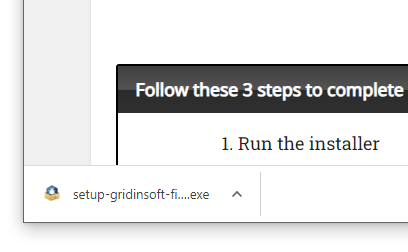
3.Follow the installation setup wizard's instructions diligently.
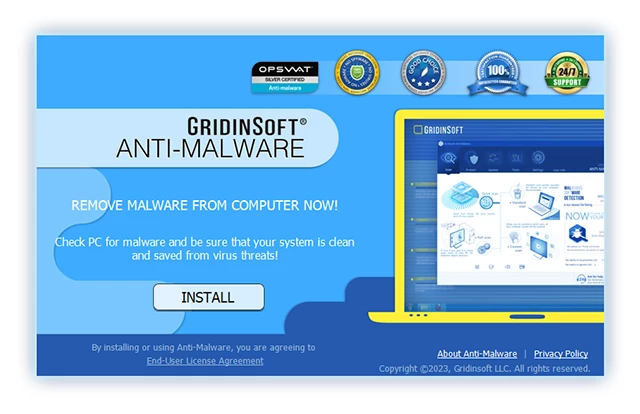
4. Access the "Scan Tab" on the application's start screen and launch a comprehensive "Full Scan" to examine your entire computer. This inclusive scan encompasses the memory, startup items, the registry, services, drivers, and all files, ensuring that it detects malware hidden in all possible locations.
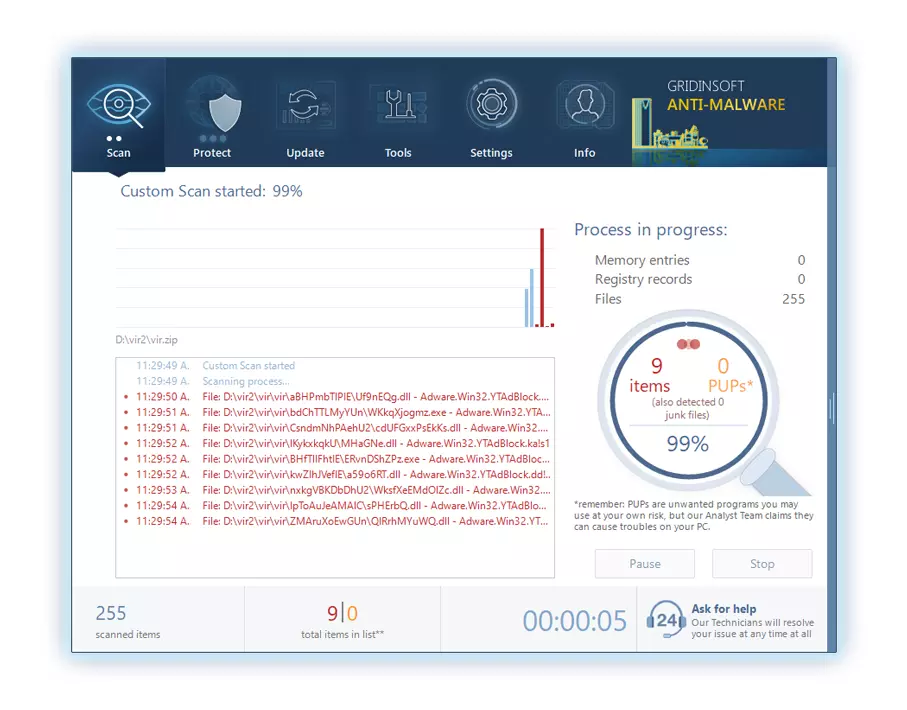
Be patient, as the scan duration depends on the number of files and your computer's hardware capabilities. Use this time to relax or attend to other tasks.
5. Upon completion, Anti-Malware will present a detailed report containing all the detected malicious items and threats on your PC.
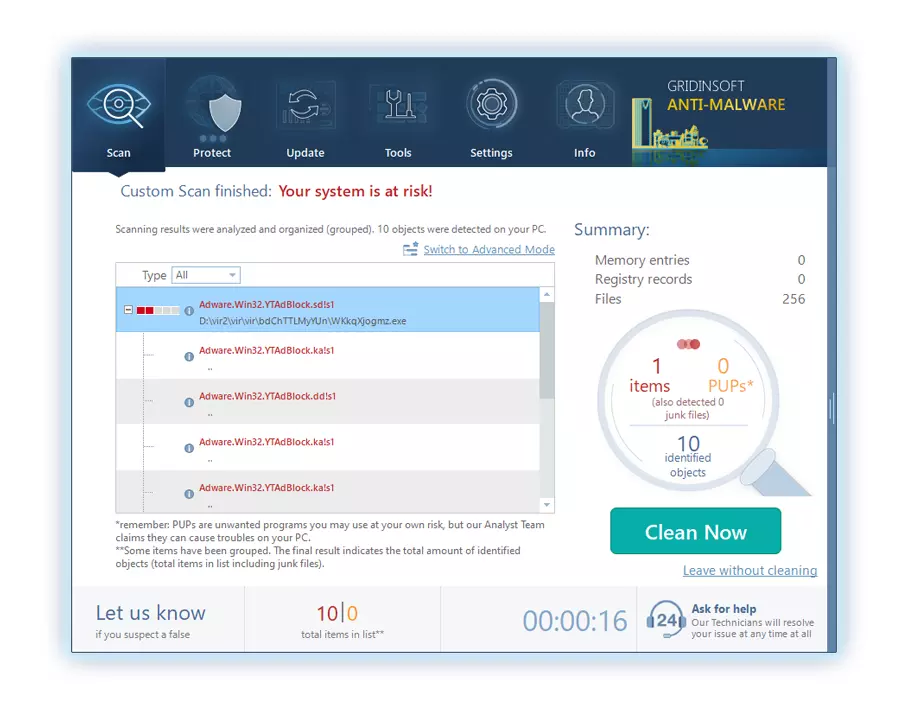
6. Select all the identified items from the report and confidently click the "Clean Now" button. This action will safely remove the malicious files from your computer, transferring them to the secure quarantine zone of the anti-malware program to prevent any further harmful actions.

8. If prompted, restart your computer to finalize the full system scan procedure. This step is crucial to ensure thorough removal of any remaining threats. After the restart, Gridinsoft Anti-Malware will open and display a message confirming the completion of the scan.
Remember Gridinsoft offers a 6-day free trial. This means you can take advantage of the trial period at no cost to experience the full benefits of the software and prevent any future malware infections on your system. Embrace this opportunity to fortify your computer's security without any financial commitment.
Trojan Killer for “spyware” removal on locked PC
In situations where it becomes impossible to download antivirus applications directly onto the infected computer due to malware blocking access to websites, an alternative solution is to utilize the Trojan Killer application.
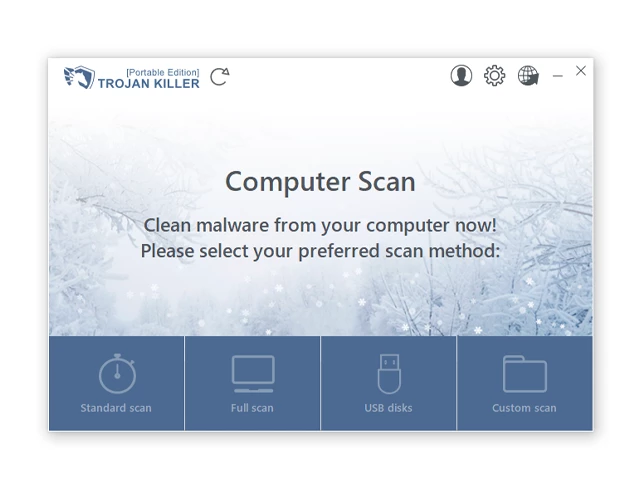
There is a really little number of security tools that are able to be set up on the USB drives, and antiviruses that can do so in most cases require to obtain quite an expensive license. For this instance, I can recommend you to use another solution of GridinSoft - Trojan Killer Portable. It has a 14-days cost-free trial mode that offers the entire features of the paid version. This term will definitely be 100% enough to wipe malware out.
Trojan Killer is a valuable tool in your cybersecurity arsenal, helping you to effectively remove malware from infected computers. Now, we will walk you through the process of using Trojan Killer from a USB flash drive to scan and remove malware on an infected PC. Remember, always obtain permission to scan and remove malware from a computer that you do not own.
Step 1: Download & Install Trojan Killer on a Clean Computer:
1. Go to the official GridinSoft website (gridinsoft.com) and download Trojan Killer to a computer that is not infected.
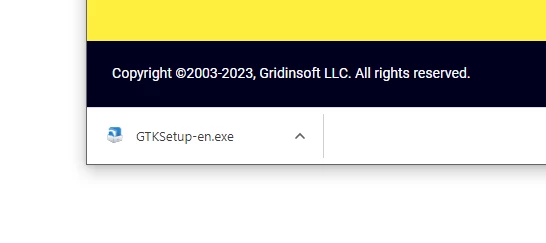
2. Insert a USB flash drive into this computer.
3. Install Trojan Killer to the "removable drive" following the on-screen instructions.
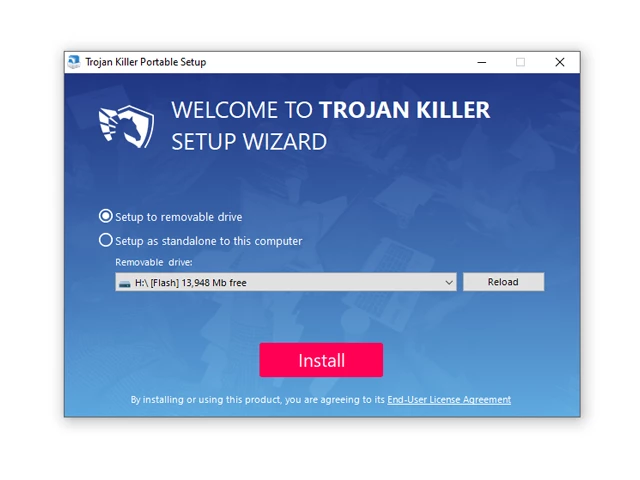
4. Once the installation is complete, launch Trojan Killer.
Step 2: Update Signature Databases:
5. After launching Trojan Killer, ensure that your computer is connected to the Internet.
6. Click "Update" icon to download the latest signature databases, which will ensure the tool can detect the most recent threats.
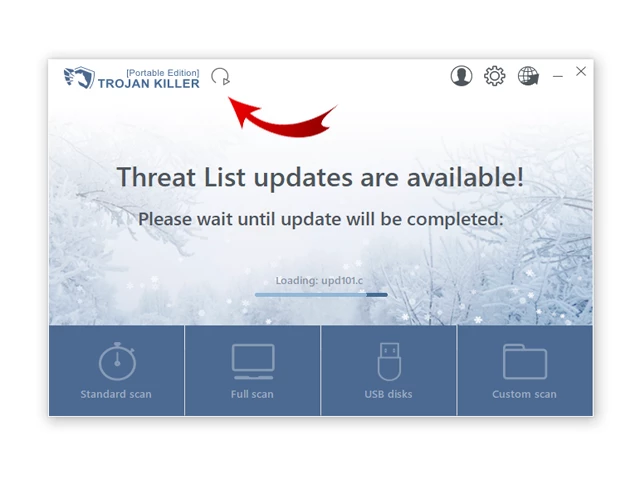
Step 3: Scan the Infected PC:
7. Safely eject the USB flash drive from the clean computer.
8. Boot the infected computer to the Safe Mode.
9. Insert the USB flash drive.
10. Run tk.exe
11. Once the program is open, click on "Full Scan" to begin the malware scanning process.
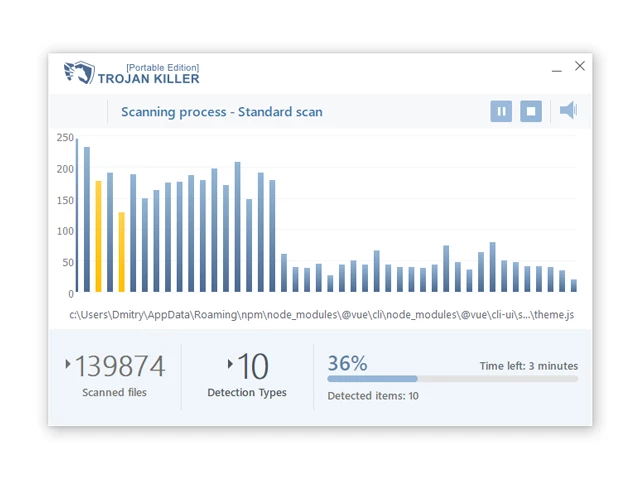
Step 4: Remove Found Threats:
12. After the scan is complete, Trojan Killer will display a list of detected threats.
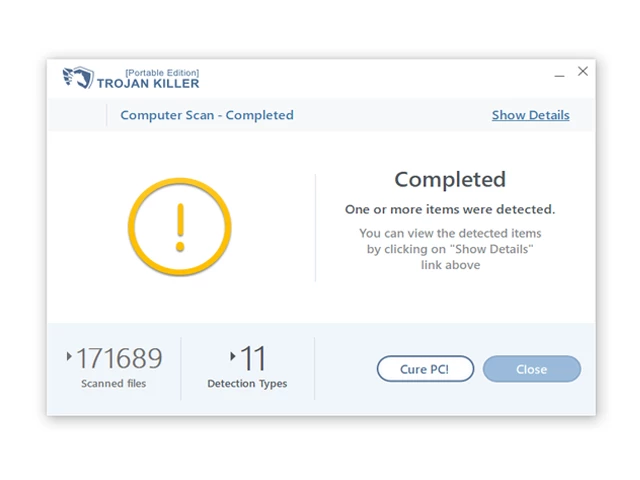
13. Click on "Cure PC!" to remove the identified malware from the infected PC.
14. Follow any additional on-screen prompts to complete the removal process.
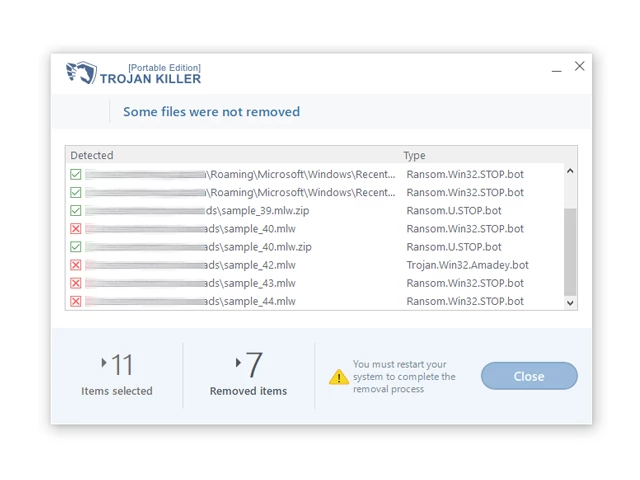
Step 5: Restart Your Computer:
15. Once the threats are removed, click on "Restart PC" to reboot your computer.
16. Remove the USB flash drive from the infected computer.
Congratulations on effectively removing spyware and the concealed threats from your computer! You can now have peace of mind, knowing that they won't resurface again. Thanks to Gridinsoft's capabilities and commitment to cybersecurity, your system is now protected.
Frequently asked questions
The vast majority of information posted on the Cointuz site is false. It is either fabricated, or a manipulation that misses the context of mentioned events. However, things like quotes or other interactive elements related to current prices may be trustworthy. But I would rather avoid using them as a primary source of information.
No, there is no legitimate information on the Cointuz site. The operators of this site use fabricated details and deceptive tactics to create an appearance of credibility, such as appealing visuals and claims of being a licensed company. However, these claims are false, and the site is part of a larger network of interconnected crypto scam sites designed to defraud victims. The scammers manipulate users into providing sensitive personal information and making deposits, ultimately leading to the loss of funds.
Unfortunately, recovering funds lost to a scam like Cointuz can be extremely challenging, if not impossible. Scammers often operate from obscure locations and use various tactics to cover their tracks, making it difficult to trace or retrieve the stolen funds. In many cases, these scams are designed to exploit victims and disappear once they have obtained the money.
Spotting crypto trading scams requires vigilance and a critical eye. Here are some tips to help you identify potential crypto trading scams in the future:
- Too Good to Be True Promises. Be cautious of offers that promise unrealistically high returns or guaranteed profits. If an investment opportunity sounds too good to be true, it likely is.
- Pressure to Act Quickly. Scammers often use tactics like creating a sense of urgency to pressure you into making quick decisions. Legitimate investments allow you time to research and consider your options.
- Lack of Regulation or Licensing. Check if the platform or service is regulated and licensed by relevant authorities. Scammers often operate without proper authorization.
- Social Proof and Celebrity Endorsements: Be skeptical of endorsements from celebrities or public figures. Scammers often fabricate endorsements to gain credibility.
- Check for Reviews and Feedback: Look for independent reviews and feedback from other traders. Scammers may fabricate positive reviews, but negative reviews can provide valuable insights.
If you have become a victim of a Cointuz or similar crypto trading scam, it’s important to take immediate action to minimize further damage and increase the chances of recovering your losses. Here’s what you should do:
- Document the Events. Gather and safeguard all pertinent information, including emails, screenshots, transaction records, and any correspondence with the scammers. This documentation holds utmost importance for reporting the scam and seeking assistance.
- Contact Financial Institutions. If you conducted any payments or deposits through your credit card or bank account, promptly notify your financial institution. They might offer assistance in contesting transactions or initiating chargebacks.
- Seek Legal Advice. Consult with a legal professional who specializes in fraud or financial matters. They can provide advice on potential legal actions you can take to recover your funds.
- Inform the Authorities. Lodge an official report with your local law enforcement agency and relevant regulatory bodies within your country. Present them with the amassed evidence. This step instigates investigations and enhances awareness about the scam.
- Notify Cryptocurrency Exchanges. Should you have employed a cryptocurrency exchange for transactions linked to the scam, inform the exchange about the fraudulent activity. In certain cases, they could extend their assistance.
- Consult Legal Counsel. Seek counsel from a legal expert specialized in fraud or financial matters. They can provide guidance on potential legal avenues for recovering your funds.
- Immediately Halt Communication. Once you recognize that you have fallen victim to a scam, cease all communication with the scammers. Refrain from responding to their emails, messages, or phone calls.
The truth about Cointuz

Name: Cointuz
Description: Cryptocurrency scams continue to increase as digital assets achieve mainstream adoption. A recent example of such a scam involves Cointuz, a fraudulent crypto exchange that entices victims with promises of free crypto giveaways. This detailed article will extensively examine the operations of the Cointuz scam, techniques for recognizing it, and, most crucially, ways to evade becoming a victim.
Operating System: All
Application Category: Crypto Scams





